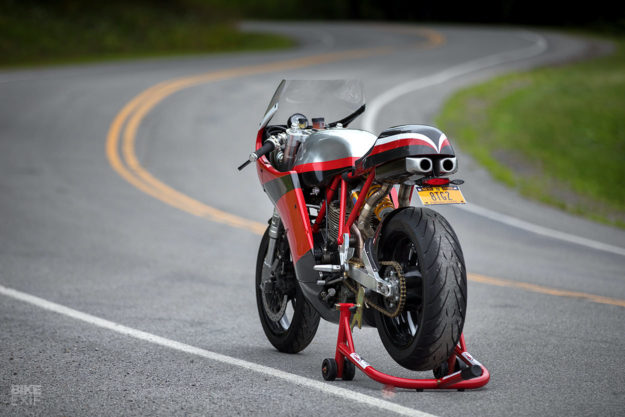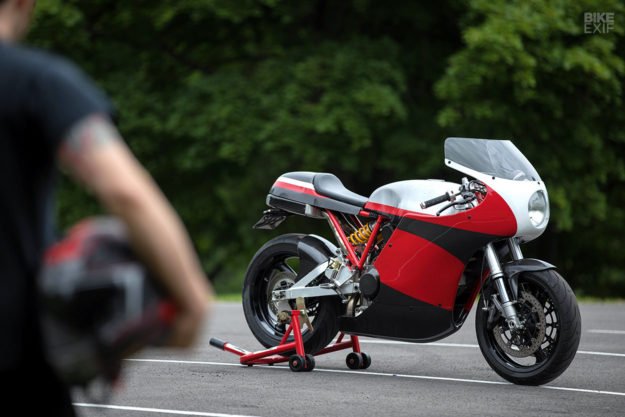
Ducati’s back catalog is littered with hits and misses. Consider the Ducati 900 SuperSport: the early 1990s version is a classic beauty; the early 2000s version, not so much.
Pierre Terblanche‘s 1998 revamp of the 900SS was an acquired taste, and hasn’t dated well. So it’s in no danger of becoming an overpriced collector’s item.
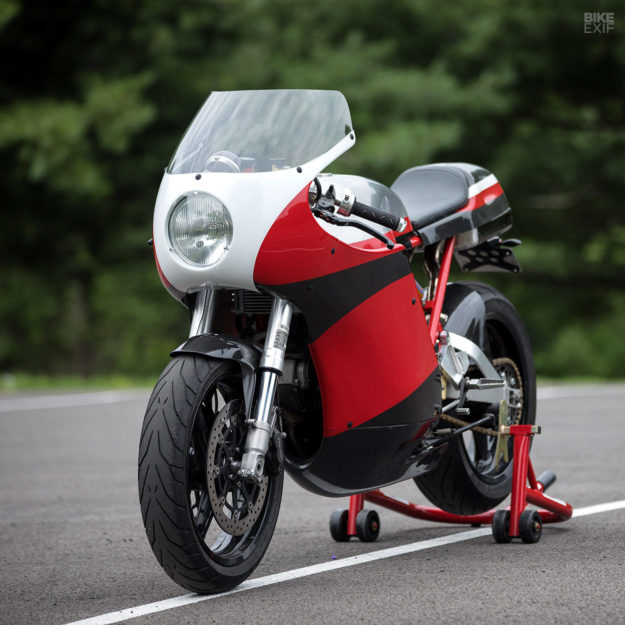
For now, you can still pick one up for under $3,000 in the States, peel back the layers, and enjoy a custom bike with decent performance. Which is probably why so many Ducati 900SS projects have been creeping out of the woodwork lately.
This latest example comes out of Rochester, NY, and it’s the first Ducati build by Sean Pelletier, sole proprietor of The Motoworks.
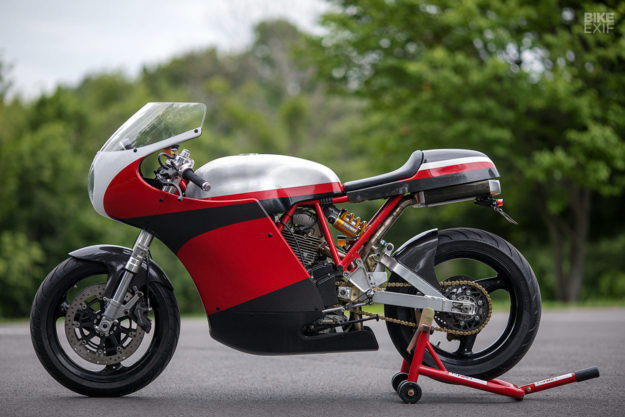
“I’ve historically built Japanese vintage bikes,” he explains, “but when I started playing with Italian v-twins, I fell in love with the way they make power and the no frills design. This was an exercise in reducing weight and seeing what I could build in-house.”
The donor was a 2001-model 900SS, with an older motor wedged in. And it was in a state. “The previous owner liked wheelies and hated routine maintenance,” explains Sean, “so it needed a thorough going-through.”
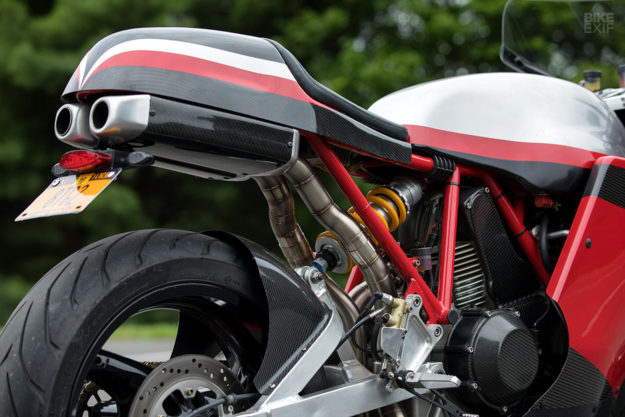
Sean often calls in his friend Toby to help with engine work. Toby stripped the 900’s motor, inspected everything, and replaced anything that wasn’t within spec. “I got a lot of info from Bruce Meyers about those motors,” says Sean. “Things not in the shop manuals. So I would consider it a semi-blueprinted engine built to be ridden pretty hard.”
The cylinders were rebored and plated, and fitted with 94mm Pistal Racing pistons—pushing the displacement out to 944 cc. The guys also installed new valves, recut the seats, then installed a Barnett clutch assembly. They built covers for the clutch, belt and sprocket out of carbon, and ditched the air box in favor of a pair of pod filters.
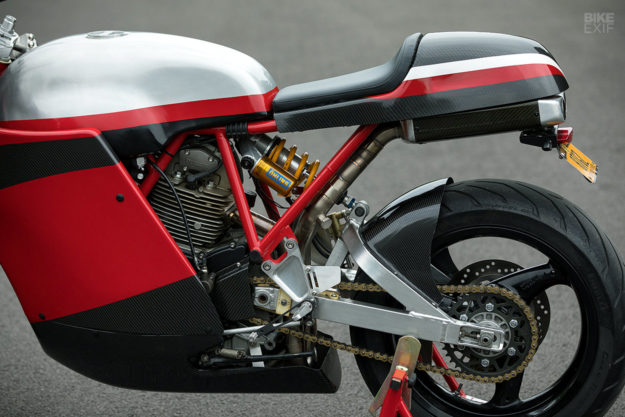
Sean didn’t wedge the hot-rodded motor back into the original frame though. Instead, he picked up a truly exotic upgrade: a Walt Siegl Leggero frame. “His shop is about five miles from where I grew up, and I went to high school with his lead fabricator. I visited, and was really impressed with how light and small the Leggero was.”
All that was needed now was a redesigned subframe to hold the tail section Sean planned to build. “I welded on two side frame mounts and brazed on some weld nuts and that was it,” he says. “Working with Walt’s frame was so much nicer than spending hours grinding pounds of steel tabs and mounts off stock frames.”
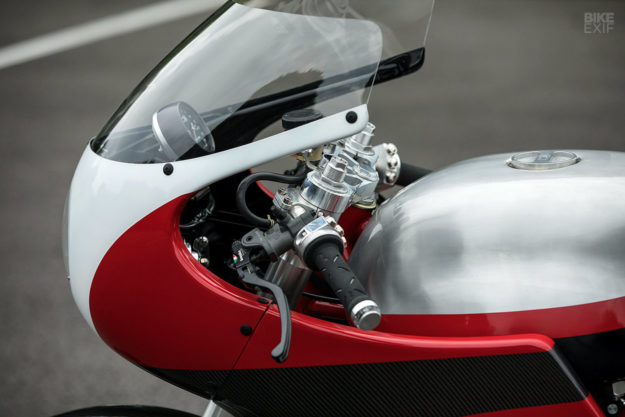
Sean hooked the chassis up to a set of Suzuki GSX-R750 forks, using custom triples CNC machined in-house. The forks were resprung and fitted with Race Tech ‘Gold’ valves.
The 900SS’s stock Öhlins shock felt great out the box, so it was left alone. And the donor came with upgraded front brakes, so there was no need to swap those out either. Sean simply switched the master cylinders for Brembo units, to improve braking feel.
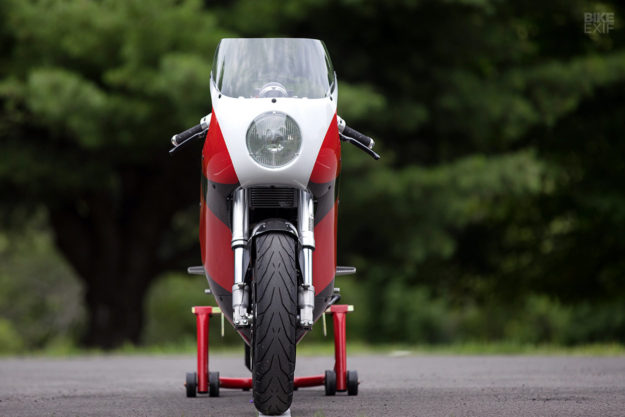
All the bodywork is Sean’s handiwork—starting with the carbon fiber fairing and tail section. It’s the first time he’s shaped with carbon fiber, and that meant a steep learning curve. “To make nice, light parts, you need to build them in a flawless mold,” he explains.
Step one was to mock up the shapes with steel wire and a MIG welder (“sort of sketching in 3D”). Sean then took photos and measurements, used 3D software to create the final design, and CNC cut molds from high-density urethane foam. Then he coated the molds in primer, polished them, and shaped up a final set of molds from fiberglass. The carbon was then vacuum infused.
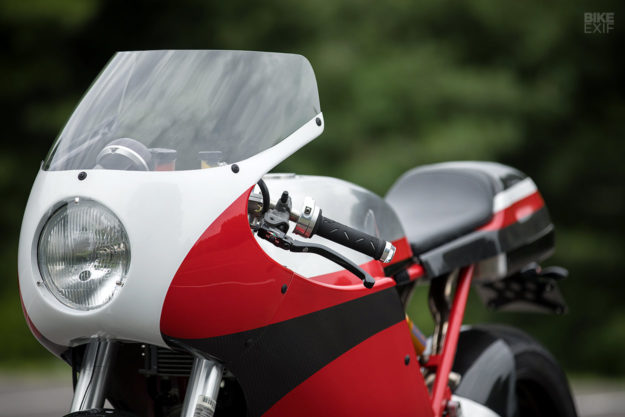
“Aside from the design time,” says Sean, “building patterns this way is much faster than older techniques and hand carving. Ironically though, weeks before going to the 2017 Handbuilt Show, I got an itch that the front fairing wasn’t shaped the way it should be.
“I reworked the patterns with thickened bondo, wood carving tools and sandpaper, because I didn’t want to completely throw away what I already had done. So the bike is still a mix of old and new techniques.”
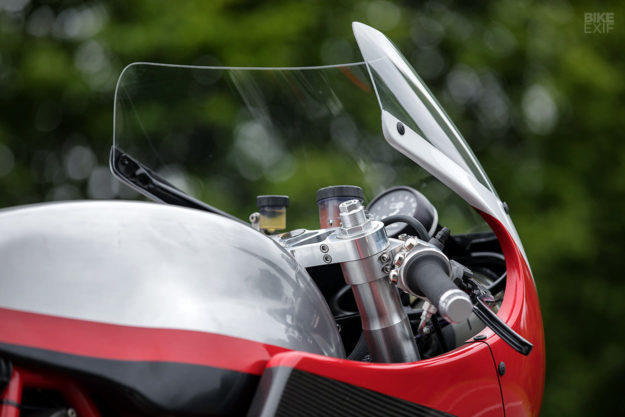
Sean has way more experience bending metal, so he opted for aluminum for the tank. The metalwork was done with an English wheel that Sean built himself, along with a small electric power hammer and hand tools.
The number of one-off pieces on this Ducati is staggering. Sean machined up a whole stack of aluminum parts, including the gas cap, rear-set hangers, heel guards, muffler caps and fairing mount bracket.
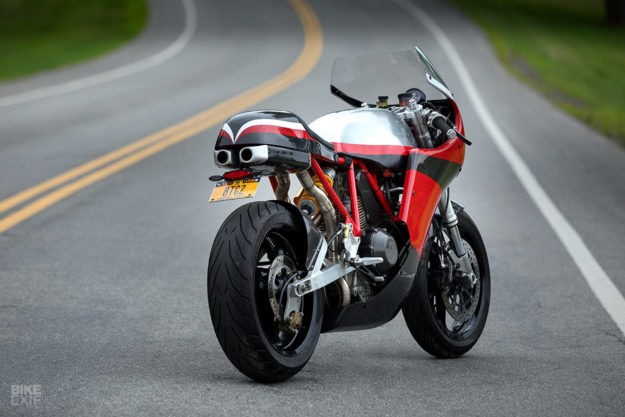
The taillight and license plate arrangement is custom too, and is kitted with lighting from Dime City Cycles. Then there’s that exhaust; hand-made stainless steel headers, flowing into hand-made mufflers, wrapped in carbon fiber with a high heat resin.
There’s a lot of practical thought too. The custom clip-ons can be adjusted up and down just by rotating them. And the foot controls were built with a locating pin, which can be moved to adjust the angle in 12-degree increments.
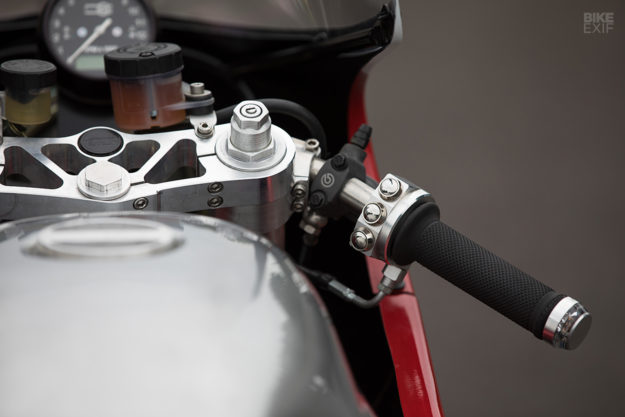
The handlebar switches are also custom, with the throttle reel integrated into the right side cluster. And there’s an RFID keyless ignition from Motogadget integrated into the top tripe clamp. “If I can find something on the market that I really like, I use it without fail,” says Sean. “But when that doesn’t happen, I wind up spending (probably a bit too much) time making my own.”
The Ducati’s new speedo takes this philosophy to the extreme. Sean had a really specific look in mind—and couldn’t find something off-the-shelf to match it. So he built his own housing, designed the circuitry, and programmed an Arduino microcontroller kit to drive an analog needle and run the LCD display.
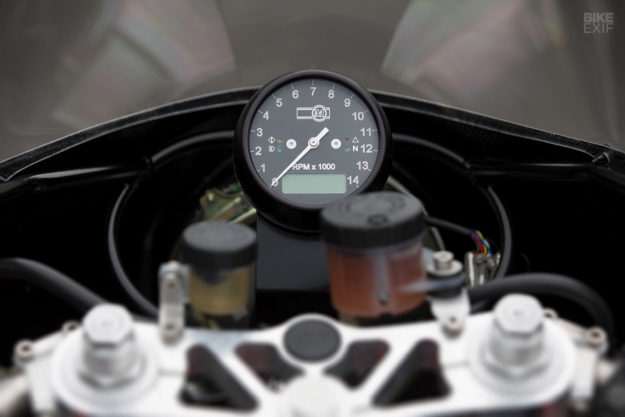
Naturally, Sean tackled the upholstery and paint too. “I get to use this cool old Singer 29-4 treadle machine I got from my grandfather,” he says, “He used it to repair saddles and it works like a charm for thick vinyl and leather.”
“I also did the paint—there weren’t any available bike painters in town. My shop is hardly clean enough to do A-plus work, but at a pinch, I can do it—and wet sand and polish out any bugs that land in the clear.”
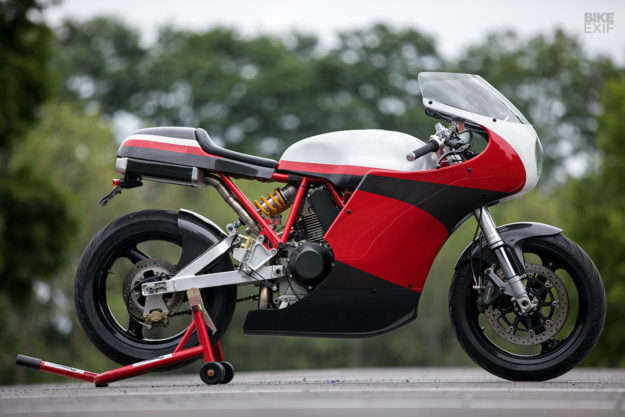
It looks very good from where we’re standing. And apparently it goes well too—Sean’s been using it as both a show bike and a track day weapon.
“It’s quite a blast on the track,” he reports. “I love how well it handles, the light weight helps keep the speed up through corners and chicanes.
“I’m now planning on building a dedicated track bike based on this design, with a more developed engine and lighter weight. I estimate I can get the track bike down to less than 300lbs.”
Well…we’re waiting.
The Motoworks | Facebook | Instagram | Images by Michael Hanlon
